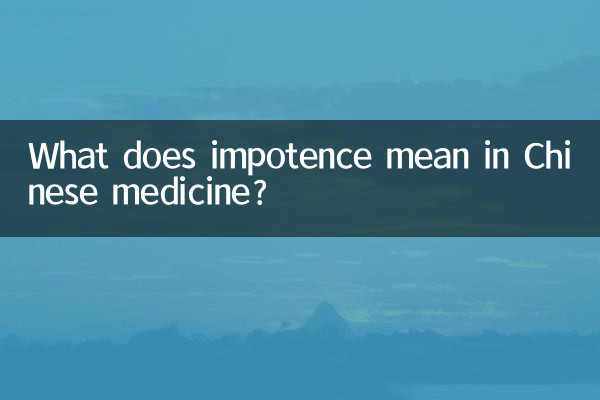What does impotence mean in Chinese medicine?
In recent years, as the topic of health and wellness continues to heat up, some professional terms in traditional Chinese medicine theory have gradually become the focus of public attention. Among them, the term "ankylosing syndrome" has been much discussed due to its correlation with a variety of modern diseases. This article will combine the hot topics and hot content on the Internet in the past 10 days to deeply analyze the meaning, cause, symptoms and treatment methods of "febrile syndrome in traditional Chinese medicine", and present relevant content in the form of structured data.
1. The traditional Chinese medicine definition of impotence

Aojue is a term in Chinese medicine, consisting of two concepts: "Ao" and "Aojue":
Traditional Chinese medicine believes that impotence is mostly related to dysfunction of the liver, kidneys, spleen and other organs, or is caused by insufficient qi and blood or meridian blockage.
2. The relationship between hot health topics on the Internet in the past 10 days and impotence
After sorting out the popular health topics on the Internet in the past 10 days, we found that the following content is highly related to flaccidity:
| hot topics | Related points | Discussion popularity (index) |
|---|---|---|
| The dangers of sitting for long periods of time | Sitting for a long time damages the spleen, and spleen deficiency may lead to impotence syndrome | 85,000 |
| Insomnia and liver and kidney deficiency | Insufficient liver blood may cause impotence and syncope | 92,000 |
| Chinese medicine treatment for cold hands and feet | One of the typical manifestations of syncope syndrome | 78,000 |
| Chinese medicine interpretation of sub-health status | Early symptoms of impotence are often ignored | 65,000 |
3. Common causes and symptoms of impotence
According to the theory of traditional Chinese medicine, the causes of impotence can be divided into the following categories:
| Cause type | Specific performance | Typical symptoms |
|---|---|---|
| Liver and kidney deficiency | Soreness of waist and knees, dizziness and tinnitus | Weakness of lower limbs and fatigue easily |
| Spleen deficiency and dampness | Loss of appetite and loose stools | Muscle atrophy and heaviness |
| Qi and blood deficiency | Pale complexion, palpitations and shortness of breath | Cold limbs and easy fainting |
| Meridian stasis | local pain, numbness | Movement disorders, stiffness |
4. Chinese medicine methods for treating impotence and syncope
For flaccidity, traditional Chinese medicine advocates "syndrome differentiation and treatment". The following are common treatment plans:
5. Impotence from the perspective of modern medicine
It is worth noting that some symptoms of impotence may overlap with diseases such as "peripheral neuropathy" and "muscular dystrophy" in modern medicine. If symptoms continue to worsen, it is recommended to combine Western medicine examinations (such as electromyography, blood biochemistry) for further diagnosis.
Conclusion
As a characteristic disease of traditional Chinese medicine, flaccidity reflects an imbalance in the overall function of the body. Through the analysis of recent Internet hot spots, it can be seen that the public's attention to sub-health conditions and traditional Chinese medicine conditioning has increased significantly. If relevant symptoms occur, it is recommended to consult a professional Chinese medicine practitioner in time to avoid delaying treatment.

check the details

check the details